- A
- A
- A
- ABC
- ABC
- ABC
- А
- А
- А
- А
- А
- HSE University
- Faculties
- Faculty of Humanities
- School of History
- Events
- Second International Conference on the Orientalist Arts and Culture"Orientality: Beyond Foreign Affairs”
105066 Moscow, Staraya Basmannaya 21/4, building 3
Phone: +7 (495) 772 95 90 *22858
The HSE School of History was established in 2015 on the basis of the HSE faculty of history. The School's staff brings together leading scientists in various fields of historical knowledge who are widely known and respected in Russia and the international academic community. The School’s instructors are leading historians are authors of numerous books and articles, regular participants in major international scientific forums and research projects, and are also known as popularizers of historical knowledge. The HSE School of History actively cooperates with leading foreign universities and research centers, and organizes international scientific conferences, symposia, and colloquiums.
Strasbourg: Presses universitaires de Strasbourg, 2023.
Misiak M., Butovskaya M., Sorokowski P.
Food Quality and Preference. 2024. Vol. 114.
In bk.: Picturing Russian Empire. Oxford: Oxford University Press, 2024. Ch. 6. P. 66-73.
Kolesnik A., Rusanov A.
Working Papers of Humanities. WP. Издательский дом НИУ ВШЭ, 2021. No. 205.

Second International Conference on the Orientalist Arts and Culture"Orientality: Beyond Foreign Affairs”
Call for Papers
Second International Conference on the Orientalist Arts and Culture "Orientality: Beyond Foreign Affairs”
Organized by the Orientalist Museum, Doha
Venue: National Portrait Gallery, London, UK
Time: 2-3 June 2015
________________________________________
Conference Focus
The Orientalist Museum in Doha has of one of the most significant collections of Orientalist art ever assembled in the world. It offers a unique ideology of the Orientalist art history and is the only institution in the world dedicated solely to the Orientalist art. Its collection of paintings, watercolours, drawings and prints, as well as sculptures and applied art traces the Orientalism back to the early 16th century. Orientalism as a historical and cultural event has been uniting various aspects of cultural life for a number of centuries, including literature, fine arts, architecture, music, and philosophy, and has generated an exotic image within our consciousness, one that has a right to its own existence.
Through future exhibitions and programming, the Orientalist Museum is mapping one of the most influential periods in art history, and by linking it to the present is able to deliver a new understanding of the world of the ‘others’. Because the Orientalist Museum is currently not in full operation, it is not open to the general public. However, for those interested in viewing some of the collection, selections of significant artworks are loaned to international museums for exhibitions on a regular basis, as well as displayed in exhibitions organized by the Orientalist Museum, itself, in Doha and internationally.
The museum first international conference „Orientality: Cultural Orientalism and Mentality” is part of the institution educational activities. The conference was organized in collaboration with the University of Cambridge’s Pembroke College, and took place in May 2013. Museum professionals and distinguished academics in art history and cultural studies gathered to promote the study of cultural orientalism, including visual art, literature, music and dance. During the conference a critical reassessment of the orientalist art movement provided an entrance into a broader discussion.
Museum second biennale Orientality conference is dedicated to the subject of foreign affairs and diplomacy. The diplomacy is defined as the practice of conducting international relations, as in negotiating alliances, treaties, and agreements. Diplomacy is the employment of tact to gain strategic advantage or to find mutually acceptable solutions to a common challenge. But very often, as the history proves us, the art can act as a diplomatic tool as well – starting from the international practices of gift exchange during political mission, signing of peace treaties, wedding ceremonies, to the development of ambassadorial subject in fine art – detailed records of all the stages of these important political missions. The way these relations were reflected in art and culture, from the fifteenth century until present, demonstrates variations following political alliances, victories and defeats, diplomatic relations, commercial ventures, and art projects. This conference seeks to investigate various approaches to the subject of diplomacy in art, history and culture, and the conference aim, therefore, is to discuss a wide range of historical and present-day 'images' and cultural heritage of international diplomacy between the Middle East and North African countries and the world around them.
The purpose of this multidisciplinary and international conference is to give scholars from various backgrounds and geographical areas an opportunity to meet and discuss ideas, creating an interdisciplinary conversation on the role of the orientalist art movement in art, history, politics and society.
________________________________________
Submit a Conference Proposal
For the conference, curators and academic researchers are invited to (re)explore the history of diplomacy and diplomatic encounters between the Middle East and North African countries and the rest of the world in the context of art, history and culture. Proposal ideas that extend beyond these thematic areas will also be considered. The call for papers is open to both institutional and independent researchers. Abstracts of 300 words (plus short resume of 150 words) should be emailed to OMconference@qma.org.qa before 1 November 2014. Museum committee will assess the abstracts by December 2014 and determine the final selection. Selected papers will be delivered at the National Portrait Gallery in London during a two days conference to be held from 2 to 3 June 2015. A detailed program will be announced in March 2015. The conference fee covers travel and accommodation expenses for the conference participants, as well as entrance to the museum, snacks and drinks organized within the framework of the conference for all attendees. The proceedings of the conference will be published in a biennale journal of the conference “Orientality”
- About
- About
- Key Figures & Facts
- Faculties & Departments
- International Partnerships
- Faculty & Staff
- HSE Buildings
- Public Enquiries
- Studies
- Admissions
- Programme Catalogue
- Undergraduate
- Graduate
- Exchange Programmes
- Summer University
- Summer Schools
- Semester in Moscow
- Business Internship
-
https://elearning.hse.ru/en/mooc/
Massive Open Online Courses
-
https://www.hse.ru/en/visual/
HSE Site for the Visually Impaired
-
http://5top100.com/
Russian Academic Excellence Project 5-100
- © HSE University 1993–2024 Contacts Copyright Privacy Policy Site Map
- Edit



